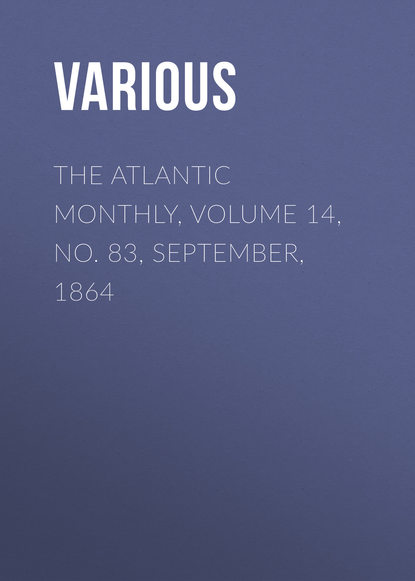 Полная версия
Полная версияПолная версия:
The Atlantic Monthly, Volume 14, No. 83, September, 1864
The Forest Arcadia of Northern New York. Embracing a View of its Mineral, Agricultural, and Timber Resources. Boston. T. O. H. P. Burnham. 16mo. pp. 224. $1.50.
Azarian: An Episode. By Harriet Elizabeth Prescott, Author of "The Amber Gods," etc. Boston. Ticknor & Fields. 16mo. pp. 251. $1.25.
Man and his Relations: Illustrating the Influence of the Mind on the Body; the Relations of the Faculties to the Organs, and to the Elements, Objects, and Phenomena of the External World. By S. B. Brittan, M. D. New York. W. A. Townsend. 8vo. pp. xiv., 578. $3.50.
A Summer Cruise on the Coast of New England. By Robert Carter. Boston. Crosby & Nichols. 16mo. pp. 261. $1.00.
The Cliff-Climbers; or, The Lone Home in the Himalayas. A Sequel to "The Plant-Hunters." By Captain Mayne Reid, Author of "The Desert Home," "The Boy-Hunters," etc., etc. With Illustrations. Boston. Ticknor & Fields.
1
Journal du Magnétisme, for 1846, pp. 80-84.
2
Pp. 89-106.
3
In Dr. Tanchon's pamphlet, pp. 46-53.
4
Enquête, sur l'Authenticité des Phénomènes Électriques d'Angélique Cottin, par le Dr. Tanchon. Baillière, Paris, 1846.
5
See Minutes of the Academy, Session of Monday, February 16, 1846.
6
Enquête, etc., p. 49.
7
Ibid. p. 40.
8
Ibid. p. 42.
9
Ibid. p. 22.
10
Enquête, etc., p. 22.
11
Ibid. p. 43.
12
Ibid. p. 47.
13
Ibid. p. 49.
14
Enquête, etc., p. 35. They were greater, also, after meals than before; so Hébert observed. p. 22.
15
Enquête, etc., p. 5.
16
I extract them from the "Journal des Connaissances Médico-Chirurgicales," No. 3.
17
The words are,—"M. Arago n'a pas aperçu nettement les agitations annoncées comme étant engendrées à distance, par l'intermédiaire d'un tablier, sur un guéridon en bois: d'autres observateurs ont trouvé que les agitations étaient sensibles."
18
Enquête, etc., p. 25.
19
Enquête, etc., p. 36.
20
M. Cholet, the individual who, in the hope of gain, furnished the funds to bring Angélique to Paris for exhibition, as soon as he perceived that the speculation was a failure, left the girl and her parents in that city, dependent on the charity of strangers for daily support, and for the means of returning to their humble home.—Enquête, etc., p. 24.
21
"Non avenues! ce serait commode, si c'était possible!"
22
Enquête, etc., p. 30.
23
Des Esprits et de leurs Manifestations Fluidiques, par le Marquis de Mirville, pp. 379, 380.
24
Elsie Venner, by Oliver Œendell (sic) Holmes.
25
It is proper to state that Miselle subsequently visited the New-England Glass Company's Works in East Cambridge, Massachusetts, and, finding the method of manufacture nearly identical with that at Sandwich, has, for convenience' sake, incorporated her observations there with this account of her visit to the latter place.
26
Life of Sir Humphry Davy, London, 1839, p. 46.
27
See letter of Thomas Poole, p. 322, Fragmentary Remains of Sir Humphry Davy.
28
Salmonia, p. 5, London, Murray, 1851.
29
Fragmentary Remains, p. 242.
30
Life and Adventures of Peter Porcupine.
31
Agricultural Biography, etc. London, 1854. Printed for the Author.
32
I ought, perhaps, to make definite exception in the case of a writer so universally accredited. In his "Encyclopædia of Gardening," he speaks of the "Geoponica" as the work of "modern Greeks," written after the transfer of the seat of empire to Constantinople; whereas the bulk of those treatises were written long before that date. He speaks of Varro as first in order of time of Roman authors on agriculture; yet Varro was born 116 b. c., and Cato died as early as 149 b. c. Crescenzi he names as an author of the fifteenth century; he should be credited to the fourteenth. He also commits the very common error in writers on gardening, of confounding the Tuscan villa of Pliny with that at Tusculum. These two places of the Roman Consul were entirely distinct and unlike.
33
Lord Byron and his Contemporaries, Vol. II. p. 258.
34
"All hail, thou Connecticut, who forever hast ran,Bringing shad to South Hadley, and pleasure to man!"


